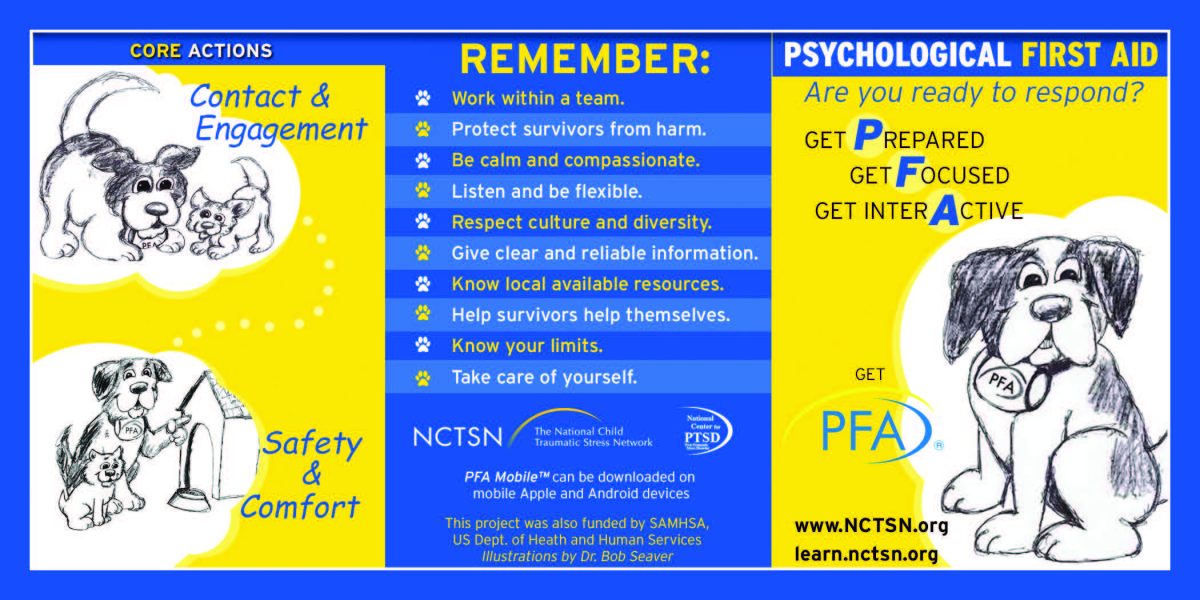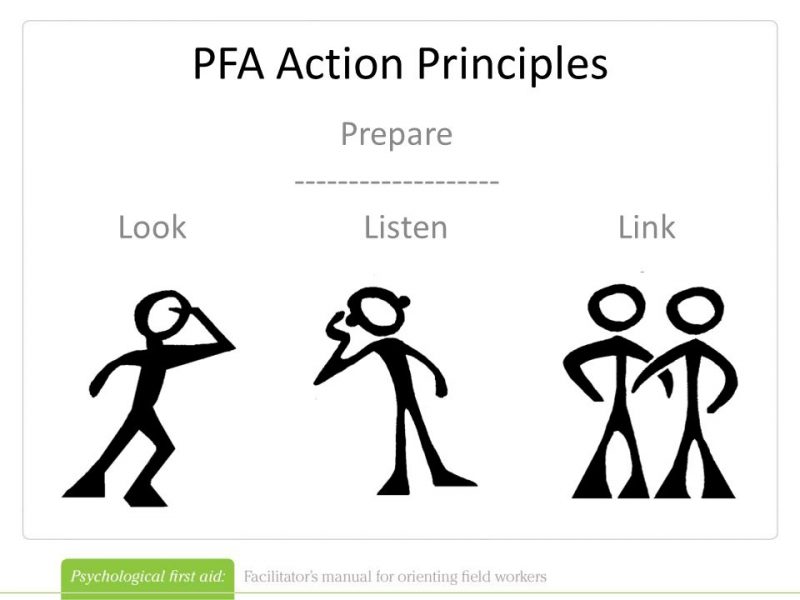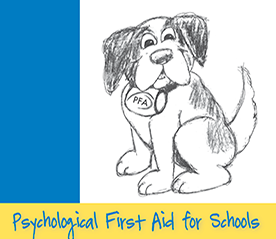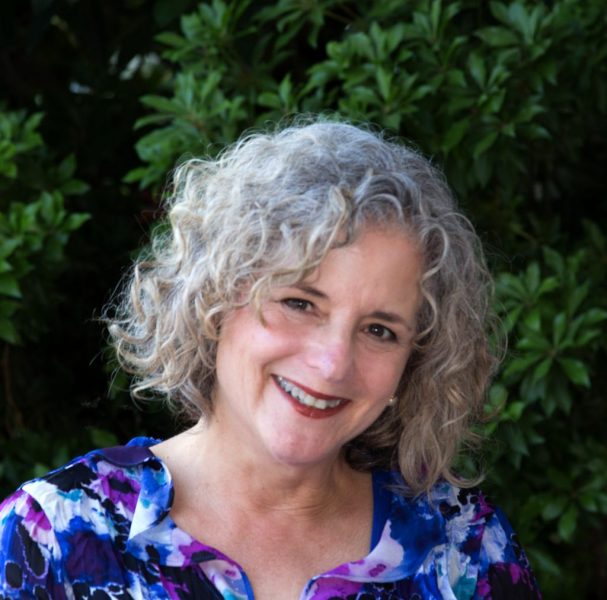This article was co-written with Gina Wind, PHD Neuropsychologist.
Approximately a month ago, schools began closing and we began remaining at home during the COVID 19 pandemic. As a result, we have altered our daily lives and families. Many parents manage working-from-home, keeping children safe, regulated, occupied and up to date with school assignments. This combined with the natural worry about the future, finances, health and safety, can be a recipe for becoming overwhelmed and stressed for anyone. Thus, we have two pandemics, Cov-2 and anxiety. The following recommendations, resources and Psychological First Aid tools may help your family during this overwhelming time. It is important that we function well now and remain positive for our families and community.
Psychological First Aid is a first line psychosocial support given to self and others following a crisis or disaster. In any disaster, we likely experience distress. Unlike a hurricane the current pandemic is ongoing, surrounded by uncertainty, and likely to last longer than any of us wish.
The rationale for PFA is as follows. When members of a community (regardless of role) provide psychological first aid to one another it creates collective resilience and can begin to help mitigate the effects of trauma and promote recovery.
This is very important during this time when our children and families need comfort and new routines.
The three tenets of PFA are to LOOK, LISTEN, and LINK.

LOOKING involves taking a personal inventory and soothing one’s self first, then focusing on comforting others. It is nearly impossible to provide good PFA in this crisis if we do not first recognize our own stress reactions and take steps to embody a calm presence. It’s completely understandable to be anxious right now, but how we manage that anxiety has a big impact on our kids. Anxiety can be very contagious. Keeping your worries in check will help you and your whole family navigate this uncertain situation as easily as possible. What are your personal signs of stress? What do you do to center yourself emotionally/physically? Relying on healthy and strong adults during this time and getting good advice may allow you to self-soothe and thus be more supportive to others.
Stress reactions in both adults and children may be apparent in how we feel emotionally and physically, in how we behave, and sometimes in our spirituality. Younger children, especially those who are less verbal, may display distress by regressing developmentally, having more challenges regulating their behavior, and present with physical symptoms such as belly aches and trouble sleeping. Most parents know their children well and know when something is “off.” These are normal reactions during this time and indicate that additional support is needed. Thus, it is important that our children can count on us for comfort during this time and that we can count on other strong adults ourselves.

LISTENING is the second key component of PFA. Listening includes having a calm compassionate presence and giving a distressed other your undivided focus. Becoming over-excited, loud, forceful in words or actions, or distracted when youth reach out could impede your ability to be most effective. When we actively listen, we can better understand the needs of those around us. People naturally calm down and symptoms are reduced when the distressed person feels that they have been heard. Active listening takes place when you reflect back what you have heard and observed. It is about your child’s story, not yours. It is not about giving advice. Children long for positive attention from parents. Spending quality time encouraging children to express themselves, during this time, can support the emotional and mental health of your family as well as to encourage children to use their own skills of staying emotionally connected. This has a calming effect and elicits less acting out.
For example, the family could limit discussing Cov-2 except when parents are calm and able to comfort their child’s emotions. They could take their cues from their children’s questions and be sensitive in what they share to ensure it matches the developmental level and maturity of the child. Please help them not get too creative about future concerns.
Assume children are feeling anxious and provide them with good resources for working on themselves such as making lists about what they worry about and next to this list what they can do to problem-solve. Avoid catastrophizing and focus on the present and making one’s environment calmer. Your family witnessing your competence in responding calmly to this crisis can be instructive and reassuring. Even better, assigning kids tasks that will help them feel that they are part of the plan and making a valuable contribution to the family will empower them. It is important to keep interactions comforting and positive. Keep kids in the loop but keep it simple. Turn off the news. When discussing tensions amongst adults ensure that children are not present or secretly listening. Taking regular breaks from stressful subjects is also helpful. Keeping the new routine relatively predictable helps a great deal. Delivering information in a positive light is another tool. For example: since we are all doing our part in protecting each other right now you will continue to have less schoolwork for a few more weeks and we will get to have more family time to relax together, therefore school is out for a few more weeks and we will know more soon – This is a nice way to deliver news of additional quarantines.

LINKING involves helping your family to meet basic needs for food, rest, and shelter. Keeping routines and daily rituals in place is very helpful and gives families something to look forward to. Parents can create opportunities for good coping and connection between people. When kids have questions and concerns it is important that parents give realistic reassurance. “Washing hands and staying home gives us the best chance to protect ourselves and others.” Give information that is accurate and timely. Say only what you know is true when you know it and don’t be afraid to research the developmentally appropriate ways to deliver said news.
The Child Mind Institute and similar resources are ways to find this information. For example, CMI points out that in the face of scary events with many aspects occurring largely out of our control, it is important to be proactive about what you can control. Such as your mood, emotions, the amount of overwhelming information that you can take in at one time.
Adapting to these circumstances as the way life is for some time will help us to make realistic plans during this time. This will help you visualize the near future. Can your kids have virtual play dates? Can they eat lunch via facetime with the friends they generally ate with at school each day? Can they watch the sunset together? Encourage family exercise such as walks, backyard games and making your own obstacle course, and playing with pets will support mental health. Involving the kids in coloring, crafts, journaling and writing notes to other family members will be soothing to them as well as giving them something to look forward to. Maintaining connections to others is critical. Some experts suggest that rhythmic activities are particularly helpful in this regard such as singing and dancing together. For a great list of virtual and home school ideas, check out Currents, organized by Arts & Humanities Bainbridge and sign up for their e-blasts.
Mindfulness techniques are great for both adults and youth. We wear stress in our bodies. The University of Washington has a progressive muscle relaxation script just for little ones that you can read to your children. Go Zen has a You Tube video that children can watch. Another resource is slow breathing. Box breathing works by slowing our breathing and resetting the neural connections our lungs, heart, and GI tract. To box breath inhale for 4 counts, hold the breath for 4 counts, exhale for 4 counts, and hold it for 4 counts and repeat.

What about teenagers? Adolescents rely on social contacts as a way of coping. Acknowledge that you know it’s frustrating for them to be cut off from friends. Listen to what they’re feeling, validate those feelings and then be direct about how you can work together to make this situation bearable. Get emotional support for yourselves regarding not personalizing their moods. Encourage gratitude and give them tasks that they can do to help the family.
Loosening rules about time spent on social media, for instance, will help compensate for the socializing time lost with school closings. Encourage them to be creative about new ways to interact with their friends socially. (Monitor media and reach out if they become dysregulated?)
https://childmind.org/coping-during-covid-19-resources-for-parents/
As schools begin to offer more online education, it is helpful to plan for academic time followed by breaks in which children and teens get to reward themselves for putting forth real effort. It may be helpful to introduce them to a schedule for this at a family meeting and be prepared to compromise so they feel involved in a fair decision. Keeping this routine may make any struggles less difficult if the school load intensifies.
It is also important to know when you need to seek outside help. This can be a lot to accept. If you witness hopelessness or suicidal ideation, there are a number of resources:
Call the Crisis Hotline: (800) 843-4793 or the National Suicide Prevention Lifeline: (800) 273-825You can also text the Crisis Text Line by texting “HOME” to 741741
Bainbridge Youth Services is offering free online counseling for kids age 13-18.
Psychology Today lists credentialed providers who accept insurance and are offering telehealth.
Bainbridge Island Psychotherapy Guild has a list of therapists who are offering virtual counseling sessions.
Ask your Primary Care Physician or Pediatrician for specific referrals for sensitive emotional needs. Additionally, there are a small number of specialists who may be able to assist such as psychiatrists or psychiatric nurse practitioners.
In summary, Mental health providers are preparing for the additional needs due to Cov-2. You are not alone and can reach out to experts before you need it, or when you need it. Additionally, Psychological First Aid concepts can be very useful during this unprecedented time and can be used by anyone, anytime. Bainbridge REcovers will be listing upcoming PFA Trainings if you want to learn more.

Linda Semlitz, MD Child Psychiatrist. Linda maintains a private practice in Child Psychiatry on Bainbridge Island. She lived and worked in Asia from 1995 – 2014. During that time she worked as a Medical Director and Director of Medical Affairs for Merck, Sharpe and Dohme, a pharmaceutical non-profit mental health organization in Tokyo that provided mental health treatment and disaster response after the 3/11 earthquake, tsunami and nuclear meltdown. She currently serves on the board of the Global Fund for Mental Health. She joined the AHB Board of Directors in 2017.

Gina Wind, PHD Neuropsychologist. Gina specializes in positive-psychology therapy with women, parenting support, young women and girls. She also offers therapy with LGBTQ+ . Gina’s work with children and teens began in high school with volunteering in a children’s hospital. Her creative therapy with young women and adults is based in positive psychology.